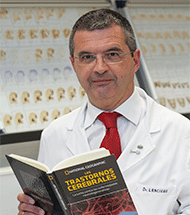More than 200 causes of brain disease
José Luis Lanciego, researcher of Cima University of Navarra, explains the current scientific challenge in the fight against neurodegenerative diseases in his second book published in National Geographic.

The human brain remains an unknown to scientists. To date, more than 200 diseases have been diagnosed that affect various bodily functions such as speech, movement, breathing or cardiac activity. Many of these diseases are genetic, others are caused by viruses or toxins, and the origin of the rest is unknown.
The progressive aging of the population has led to an increase in these conditions. "Managing to better combat these diseases is the most important scientific challenge facing medicine in the 21st century," explains Dr. José Luis Lanciego, a neuroscientist at the Cima University of Navarra, in his new book "Brain disorders: The fight against neurodegenerative diseases", published in National Geographic (RBA Editores).
Innovation in disease shielding treatments"Advances at research have placed us in a privileged position, as we know better than ever the biological, molecular and genetic processes that are related to brain disorders," explains the expert, also researcher of the CIBER on neurodegenerative diseases (CIBERNED). This information has made it possible to design highly innovative treatments, such as different vaccines, cell replacement therapies and reprogramming Genetics with viral vectors.
"The current state of this research field and the prospects for the coming decades invite optimism for a future in which the human brain will not only continue to be, as is often cited, the most complex object in the universe, but perhaps science will also make it the most armored against disease," notes Dr. Lanciego.
Beyond Alzheimer's and Parkinson's diseaseThere are currently some 600 million people over the age of 60 in the world, a figure that will rise to 2 billion in the next 50 years, 21% of the world's population. According to researcher of Cima, "these forecasts suggest that the prevalence of Parkinson's disease and Alzheimer's disease," the two neurodegenerative diseases with the highest incidence in modern society, will also increase considerably during this century. "Therefore, it is urgent to intensify the research in these diseases to deepen the knowledge of its mechanisms and to develop new therapeutic strategies."
Beyond Alzheimer's and Parkinson's there are hundreds of less common neurodegenerative diseases. Dementia with Lewy bodies, multiple system atrophy and Huntington's disease are three well-known examples of these numerous disorders. In other cases, these are demyelinating diseases, conditions in which the protective coating (myelin sheath) surrounding the nerve fibers is damaged, resulting in a reduction or cancellation of nerve impulses. This is the case in multiple sclerosis, where an autoimmune reaction against the myelin sheath causes damage to nerve fibers and neurons. A unique case is amyotrophic lateral sclerosis, characterized by the death of neurons that control voluntary muscle movement.
These few examples show a set of diseases whose common link, in addition to their leave frequency in the population, is neuronal degeneration leading to a variety of nervous symptoms. "Advances in the knowledge of neurodegenerative disorders and progress in biomedical technology are providing new strategies to improve available treatments. Recent achievements and those expected in the short and medium term deadline allow us to glimpse a much more hopeful outlook than that existing just a few years ago," concludes Dr. Lanciego.
Collection "The Challenges of Science"."Brain Disorders: Combating Neurodegenerative Diseases" is the second volume published by Dr. José Luis Lanciego in National Geographic, following the 2018 edition of "The Connectome".
They are part of a 60-volume collection entitled "The Challenges of Science", which is designed to bring the latest advances and most innovative scientific challenges to the general public.
